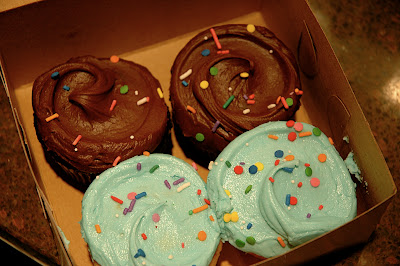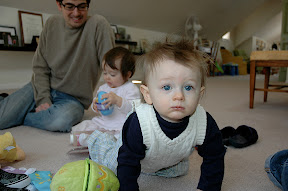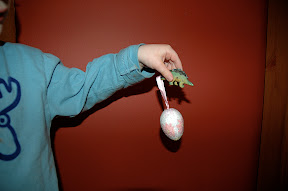I recently finished reading "The Omnivore's Dilemma" by Michael Pollen. I found it a powerful book (although the last section could have used some additional editing in my opinion,) and it's been generating learning and discussion in our household in myriad ways.

The first section of the book lays out the path of our food system's industrialization from the 20s/30s to the present day. Key turning points and decisions along the way, such as crop subsidies, monocultures, and engineering cattle to eat grain instead of grass help you understand how things used to work and how they actually operate today.

Section two considers what he refers to as the "industrial organic" food system, i.e. whole foods. Pollen is an adept writer and is amazing at taking say, the history of corn and making it a page-turner. The conclusion i drew from the book can be boiled down to: the most important thing is to buy our food locally-- from farmers that we can "inspect" and have a relationship with. This cuts down on the petroleum fueled costs of transporting food across country, circumvents the industrial system of divorcing cattle from grazing and instead moving them to feed lots, and supports farmers that are farming in an environmentally sane way, i.e. merging animals back into the land so that animals fertilize the land and the land feeds the animals. Notice i didn't say organic anywhere in here. Of course a local farmer that isn't using pesticides if even better, but the chapter on industrial organic, or the large-scale organic food producers supplying whole foods-- was an eye-opener on how large-scale organic foods are as wholesome or logical as they might seem.

The book has been producing discussion and stimulating explorations of new skills in our household in a way i deem possible because of the rise of things like Community Supported Agriculture (CSAs), local farmers' markets, numerous blogs and other Internet resources devoted to people trying to implement the same principles in their life. In other words, you don't read something that speaks to you and then feel like you have to "go off the grid" in order to implement your ideals.
It seems imminently doable to remain in our house in the city where we don't drive much and have access to public transport-- source our food from local farms (meat, dairy and produce), make as much of the other stuff as we can (i think my new interest for the summer is soap-making), grow some of our own vegetables and use native and perennial plantings in our flower garden (gone is our sorry looking lawn), keep using our cloth diapers and dry as much as possible on the line outside.

I'm not planning on quitting my job or not using electricity, and i'm happy to run my dishwasher when it's full thank you very much, but there are lots of things that help our budget, make us feel better about the food we're eating and nourishing our kids with, and show our support for the alternative suppliers to the industrial supermarkets. It doesn't hurt that it's spring and we get to start working on some of these projects!

At the end of the month we have a day-trip planned to a huge
natural plant nursery in St. Charles, IL. I'll be meeting with a garden designer who will help me plan a very small prairie for our front yard. The nursery is an extensive supplier of native plants for the region and hard-picks their seed stock from plants within 20 miles. Other day-trips this spring include a visit to the farm we ultimately pick to buy shares of and source of meat, dairy and produce from.

 Silas turned one last Thursday. We're having a combined party for he and Henry in mid-April, so additional celebration is forthcoming, but we had a little family party for him after school on Thursday evening. Henry was extremely accommodating at opening all of Silas' gifts and was even kind enough to test them all out for Silas. Silas was a bit fussy that night (did i mention he's finally getting some choppers) and after initially grabbing a big glob of cupcake icing and throwing it on the ground-- he decided that this cake/icing stuff was worth temporarily curtailing his screams for.
Silas turned one last Thursday. We're having a combined party for he and Henry in mid-April, so additional celebration is forthcoming, but we had a little family party for him after school on Thursday evening. Henry was extremely accommodating at opening all of Silas' gifts and was even kind enough to test them all out for Silas. Silas was a bit fussy that night (did i mention he's finally getting some choppers) and after initially grabbing a big glob of cupcake icing and throwing it on the ground-- he decided that this cake/icing stuff was worth temporarily curtailing his screams for.










